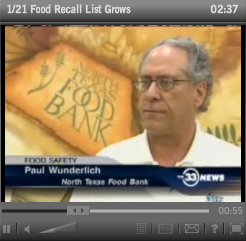 Texas Senator Eliot Shapleigh (D-El Paso) noted the growing need for anti-hunger relief while visiting HHSC offices in his hometown last week.
Texas Senator Eliot Shapleigh (D-El Paso) noted the growing need for anti-hunger relief while visiting HHSC offices in his hometown last week. "When times are tough that has budget effect," said Shapleigh. "We will go into the budget to make sure that food stamps is funded, unemployment insurance to make sure there is enough to cover people when they've lost their jobs."
According to HHSC, offices in the El Paso region are seeing an influx of new families applying for hunger relief, straining already minimal staffing levels.
"We have too much work and too few people," HHSC eligibility specialist Bill Howe told the El Paso Times. "I have a feeling that come April, it's going to bottom out, unless we've got available some more people."










